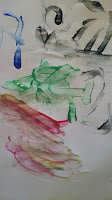 |
| MK Asante (publicity photo) |
MK Asante gave me a few minutes of his time after what he called the "academic high" of his second address to the teachers at the P20 Educator Conference at the College of Southern Idaho on Wednesday. The interview was an academic high for
me, but as it turned out, there was a tone shift, a key change, five minutes in:
"Look at that," Asante interrupts himself. "Wow."
This eminently calm man is bristling.
I look through the green CSI landscaping to where a pickup truck I hadn't noticed is making the turn to exit the campus. Its in-your-face exhaust noise isn't what has MK staring. It's the oversize Confederate flag on display in the back of the truck.
"Is that normal?" he asks. "Is that normal to you?"
It's his first visit to Idaho, and the question is entirely serious.
I look him in the eye. "I'm surprised to see it on CSI campus, honestly, right now."
We couldn't be more different--I'm white, born and raised in the white state of Maine, now living in rural, white Idaho. He's. . .MK Asante, African-American, born in Zimbabwe, grown up on the streets of Philadelphia, acclaimed recording artist, filmmaker, university prof (he's older than he looks).
I have an idea what an Idahoan might mean by flaunting a Confederate flag. Maybe support for states' rights. Maybe just being a rebel. But I want to know what it means to MK Asante. I ask him.
"It means that they support the enslavement of my people. That they wanted to keep my people in slavery. That's what it means."
I sense that he's thinking a lot more than he's saying. From his heightened tension, I wonder if he thinks it's not a coincidence, that someone knew he was going to be speaking here and decided to make a statement. I ask him that, too.
"I really don't know," he says. "I'm in a completely different space, so. . .I don't know. . . ."
Me: "There are a lot of Confederate flags in Idaho."
MKA: "Yeah, so that's what I'm saying. I mean, I don't know. They did just drive
right past here with. . .It was like they had it blaring, like, 'Yeah,' like making a statement. But you know, I mean, at the end of the day, not only do I know where I am, like, in terms of being in Idaho, but I know where I am in America. I understand America is a very racist place. You know what I mean? So I'm never surprised by anything that happens in America in terms of racism because slavery was legal in America for three hundred years. . . .But that's what [the Confederate flag] represents to me. It represents people that. . .people that are not my friends."
"Idaho is one of the least racially diverse states," I say. "I think people in Idaho don't realize how. . .
front-line that issue is when you live in Philly, or North Carolina [Asante's current home], or wherever."
"Yeah."
Asante has spoken sincerely and passionately to Idaho teachers at the conference about growing up Black in Philadelphia and about how a culture of racism and the school-to-prison pipeline were facts of life for him. I've also heard him speak (more explicitly, as one would expect) of race issues in a recording from The Breakfast Club, a NYC radio talk show. Race is far from the only thing on this creative young professor's mind (witness his resume and many albums, books, and awards). But as his memoir
Buck eloquently narrates, when you grow up Black in Philly, you have to learn two codes: the Black people's code and the White people's code. If you're white, you only have to learn one.
I haven't planned to bring up racial issues in our twenty-minute interview, though. There is no pressing need to talk about it. Asante is here to talk to teachers, who are also the audience for my imagined story. An in-depth treatment of racism in America is not the point of his message or mine this sunny day in July. I'm a teacher-blogger, not a reporter. For so many good reasons, I could leave the issue of race alone.
But racism has come up, and not because I'm asking or Asante is pushing it. The tone, the
meaning of the interview has changed.
For a while, we pick up where my questions left off. We talk about "dope" rhyme in hip hop and why the rhythms of Shakespeare and of hip hop are two completely different things.
But Asante comes back to the Confederate flag as we're wrapping up. He needs to say more specifically how seeing the flag affected him.
 |
| Asante at the College of Southern Idaho |
"We had just come from this thing in here." He motions to the Fine Arts building where he's just given his second keynote talk. "A lot of love and a lot of good energy, and so. . .I must have had my guard down a little bit, you know what I mean? It's so peaceful right here, we're sitting under this beautiful tree. . .So in a lot of ways, my guard's not up in the usual way. It's not like I'm walking down a street that I don't know. . .I'm very much feeling peaceful and, like,
at peace.
"That [the flag] completely changed my energy, like. . .Okay, now I have to be vigilant. Now. . . ." He laughs. "I just need to be aware of where the **** I am, 'cause. . .like I said, that's like a clear sign of, like, 'Yo, we hate you. And we wanna kill you. And we wanna enslave you.'" His voice remains low and calm, even as he says it.
MKA: "That's what it represents to me, so it's like, 'Okay, now I have to make sure that I'm just vigilant and protect myself. I have a family, I got a son, I have a baby on the way. . .You know, the whole Black Lives Matter thing. . .You keep hearing that language: 'Black Lives Matter, Black Lives Matter,' but it's because there are some people that really don't value Black life."
He goes on. "There were times in this country--and there are still times in this country where. . .you're like a target. So. . .that moment, it made me more vigilant. It made me more aware of my surroundings. And it broke the false sense of security that I might have had, coming out of a kind of a euphoric experience, and being on an academic kind of high. . .On a campus, you're just totally not expecting that, and then when that happens, you're like, okay. . .this **** is real, and even though I'm on this campus. . .that doesn't really matter."
Asante stands. It's time for the folks from CSI to take him to dinner. I thank him one last time, still mulling over what's happened. Something tells me he is, too.
As I head for my car, I'm hoping he won't remember Idaho only for this--won't think our state's population is represented by one random driver of a pickup truck with an in-your-face symbol of. . .Well, who knows what it really means to that driver? God forbid Idahoans should all be judged by the actions of one member of our majority demographic group.
Yet isn't that what people like the young MK Asante, growing up in Philadelphia or Pittsburgh or Chicago, have received from the bad apples in the white segment of American society?
Asante told teachers in his keynote, rhyming as per usual, "If you make an observation, you have an obligation." Whoever you are, teacher--whoever you are, American, you have an obligation. This issue affects you, whether you noticed the truck with the flag or not.
Find MK Asante on
mkasante.com.
Leave a comment below!











































